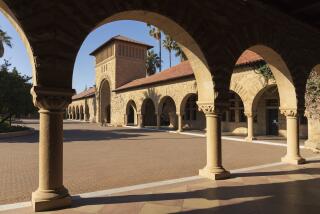Netwars Weave a New Web of Life
- Share via
Over the past few years, a loose-jointed network of nongovernmental organizations and individual activists from around the world has propelled a movement to eliminate land mines. It has gained the support of more than half the countries of the world, and it is now putting pressure on the recalcitrant remainder, including the United States, to join in the effort to abolish these indiscriminate weapons.
The effectiveness of this activist campaign confirms that the information age is altering the nature of social conflict. The new telecommunications technologies--electronic mail, Web sites, fax machines, cellular telephones--are empowering small, nongovernmental actors by enabling them to organize into sprawling but well-coordinated networks. Organizations that get networked across borders are increasingly able to outmaneuver large governments. A “global civil society” is emerging, and its often self-appointed activists are gaining impressive abilities to use “information operations” to influence states and corporations.
This heralds a major shift in world politics. The information revolution is serving to devolve power away from nation-states to networks of nonstate organizations. And wherever this devolution of power is taking hold, a sense is emerging that ethics should matter more than global power relations, especially when the issues concern human suffering.
Although power politics is not becoming obsolete, the classic model of realpolitik no longer quite fits the new realities, and is giving way to what we call “noopolitik.” The term derives partly from a notion of French scientist and philosopher Pierre Teilhard de Chardin who, early this century, foretold the rise of a globe-spanning realm of the mind--a noosphere--that would tie together disparate elements in a “web of life.” Noopolitik represents the emergence of a new approach to grand strategy and ethics that will be driven by politics of the mind rather than by the old politics of national balances of power.
The campaign to ban land mines is but one of the social “netwars” that civil society networks increasingly are waging against states that persist in emphasizing the traditional politics of power. Netwar is an information-age entry on the spectrum of conflict in that it is defined by the development of nonhierarchical, networked forms of organization, doctrine and strategy, as made possible by the new information and communications technologies. The Greenpeace-led campaign against French nuclear testing in the South Pacific and the swarming of activist organizations to the defense of the Zapatista insurgents in Mexico are other recent examples. In the latter case especially, a global network of human rights and other activists was able to ensure that fighting ended swiftly, to be replaced by negotiations. Now, by way of Jody Williams and the International Campaign to Ban Landmines, a social netwar engaged in noopolitik has won a Nobel prize.
These developments suggest that old ideas about “peace through strength” may give way to new notions of “peace through knowledge.” They also suggest that ideas themselves, particularly ones with broad ethical appeal, may be fused with advanced communications technologies and new organizational designs to create a new mode of power that national governments will have to heed.






